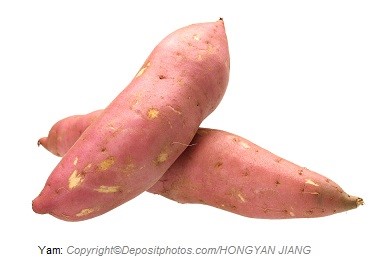Commonly mistaken with sweet potato, yam is a root vegetable from Dioscoreaceae  family. There are many varieties of yams. Yam differs from sweet potato, as they are from different botanical family and have different phytonutrients. One cup of uncooked yam contains about 42 grams of carbohydrates, 6 grams of fiber and 2.2 grams of protein.
family. There are many varieties of yams. Yam differs from sweet potato, as they are from different botanical family and have different phytonutrients. One cup of uncooked yam contains about 42 grams of carbohydrates, 6 grams of fiber and 2.2 grams of protein.
Average calories: 176 per one cup, uncooked.
|
Yam: one cup, uncooked |
|
|
Carbohydrate |
42 |
|
Fiber |
6 |
|
Protein |
2.2 |
|
Fat |
0 |
|
Calories |
176 |
Vitamins found in higher amounts: vitamins C, B6, B1, B9, and A.
Minerals found in higher amounts: potassium, manganese, copper, phosphorus, and magnesium.
Phytonutrients found in higher amounts and their health benefits: the phytochemicals are phytosterols, carotenoids, dioscorin, and diosgenin.
Phytosterols are plant sterols that can help lower bad cholesterol and improve cardiovascular health. One cup of uncooked yam has 15.2 mg of phytosterols.
The most noticeable carotenoid in yams is beta-carotene. It is a powerful antioxidant essential for healthy eyes. It also displays anti-cancer activity as well.
Dioscorin and diosgenin are saponins that show anti-cancer activities especially against blood cancers. Dioscorin is a storage protein in yams, which is different than from sporamins in sweet potato. Moreover, dioscorin acts as an ACE (angiotensin converting enzyme) inhibitor, causing a decrease in blood pressure in people with high blood pressure (hypertension).
Diosgenin has a chemical structure similar to progesterone and it is used in the lab to make progesterone and cortisone. However, since humans` bodies cannot convert diosgenin directly into progesterone due to lack of the required enzymes, it does not seem to help people with menopausal symptoms. Also there are controversial reports regarding the effect of diosgenin on male hormones.

